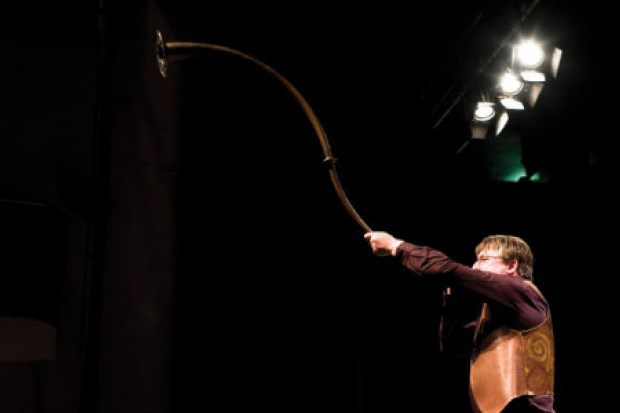Live Reviews: Galway Early Music Festival: The Irish Consort / Red Priest
The Life and Times of Grace O’Malley, the 16th Century-Century Irish Pirate Queen Augustinian Church, Galway, 17 May 2007
Pirates of the Baroque
St Nicholas Collegiate Church, Galway, 18 May 2007
In spite of the Arts Council’s mind-numbingly culture-killing funding attitude to the annual Galway Early Music Festival, it has just celebrated its twelfth year, this time with the theme of piracy. Subtitled ‘Pirates of the Corribean,’ it ran from 17-20th May. Almost predictably, Grace O’Malley led events.
The venue for the music-and-narrative of the Pirate Queen’s life by the Irish Consort was Galway’s Augustinian Church, a resonating, sound-bright space that has seen its fair share of musical performances. In three sections – Irish, Tudor and Elizabethan – this was a flawless covering of a complex period in Irish history, framed imaginatively in a spoken narrative. The opening lovely ‘Responsary for St Brigid: Felix Hiberniam,’ a late fifteenth-century antiphonal, sung marvellously by John Elwes, with Siobhán Armstrong on a Downhill Harp, a copy of the harp reputedly played by William Hempson, had the languid beauty of a ship under sail. Armstrong soloed on ‘Cailín ó chois tSiúire mé,’ a song mentioned by a character in Shakespeare’s Henry V, matched up with the haunting ‘Eilioniór a Rúin,’ rounding on the merry dance song, ‘Thugamar Féin an Samhradh Linn.’
The familiar ‘Pastime with good company’ attributed to Henry VIII, was no trouble at all to Elwes, with Laoise O’Brien on descant recorder and Armstrong on the buzz-stringed Gothic harp, and O’Brien’s playing of the bass recorder on Dowland’s ‘O sweet woods,’ words attributed to Sir Philip Sydney, against the extraordinary echoing triple harp playing of Armstrong and the soulful tones of Elwes was a joy to hear. Michael Coady read a solemn translation by James Clarence Mangan of Eochaidh Ó hEoghusa’s lamenting ‘Ode to the Maguire,’ the Fermanagh chieftain who marched in winter to Kinsale, ghosted by Armstrong’s gorgeously-pitched reiteration of ‘Felix Hiberniam’. Perhaps, Coady suggested, it would now be historically fitting and right to invite the second Queen Elizabeth to the country of Grace O’Malley! Elwes, with his uncanny ability to read the emotional intention of a piece and invest it with just the right amount of colour, concluded with ‘Come heavy sleep’ again by Dowland, with triple harp and tenor recorder. A bright, engaging performances overall, with works by, among others, Cowper, Morley and Cornysh.
It’s not Red Priest’s first prancingly irreverent performance for the festival at St Nicholas Collegiate Church, as mediaeval a setting as Galway can provide. But from the outset there were gremlins. The harpsichord, a copy of a mid-eighteenth century Franco-Flemish instrument on loan from Cork, developed engine trouble before the performance even started, requiring, among other things, a complete re-tuning. Come the end of the concert, the great double doors of the church burst open by themselves with a furious clatter of wind and leaves.
The theme of the concert was the notion of musical and artistic piracy, most Early and Renaissance composers, even those of considerable renown, having nicked whole parts of their compositions from someone else. Red Priest added to this tradition by employing intriguing and imaginative ‘recompositions’ of their own. Perhaps all that door-clattering and harpsichord failure was a sign that some ancient composers didn’t like the practice. But if it was good enough for Handel, who blatantly pinched his ‘Aria Amorosa’ from his old employer, Wilhelm Kaiser, it was clearly good enough. As some sort of salute, perhaps, to the wily old boy, harpsichordist Howard Beach played at least one note in this piece with his nose. Cocking a snook, perhaps? Red Priest, naturally, were suitably attired in black and red as pirates.
The first half proffered Bach and lively Preludio, from the Partita in E Major BWV 1006, whacking in to Giovanni Paulo Simonetti’s Sonata in C Minor Opus 5 No 2, ‘La Burrasca’, styled to suit themselves, ending raucously with a Piers Adams upwards pheep. Albinoni’s familiar Adagio may or may not have been written in 1940 by musicologist Remo Giazotto, but it opened here on Angela East’s puckishly plucked base solo, with gathering feline flourishes from Julia Bishop and a smattering of Argentinian tango. Jean-Marie Leclair’s ‘Tambourin’ involved prestidigious changes of recorder in mid-tune, while Vivalidi’s Concerto Gross in D minor, RV 565, began with a tasty, fiesty duel between violin and recorder, chaperoned by the base. This was all about showmanship, music-as-theatre. And music as fun.
Howard Beach did some neat conjuring with Francois Couperin in the second half, creating a non-existent ‘Jour des Pirates’ from several Couperin clavichord pieces. No doubt by coincidence, in the amorous seduction section in ‘Le Soir,’ the recorders grew in size as the piece progressed. ‘Burdo’ was, apparently, a lively Irish tune of the seventeenth century, belted out on the recorder; Tommaso Vitali’s ‘Chaconne,’ taken as a fake for years, turns out not to have been and it too was re-arranged for four instruments. Vivaldi’s ‘La Tempesta di Mare’, from the G Major Concerto, rounded the evening off, with some hinted references to the movie, Pirates of the Carribbean, and Howard Beach shouting ‘Shiver me timbers!’ It was around this point that the great church doors walloped open like a special effect. A wonderful evening’s musical entertainment, illustrating not only the incredible musical talent and co-ordination of Red Priest, but the sheer fun to be had from good music exquisitely performed.
Published on 1 July 2007
Fred Johnston is a novelist, critic and musician. His novel set in Paris, The Neon Rose, has just been published.












